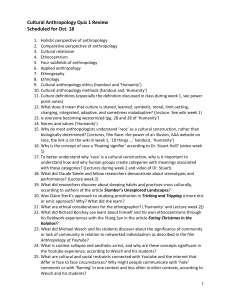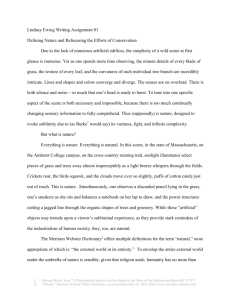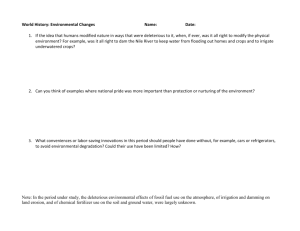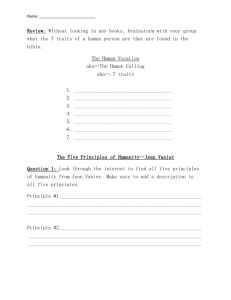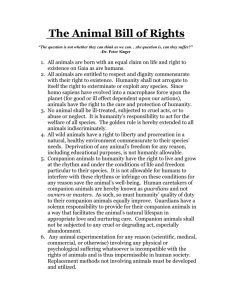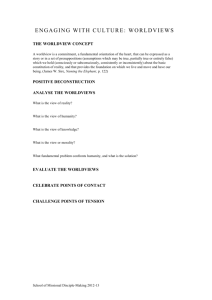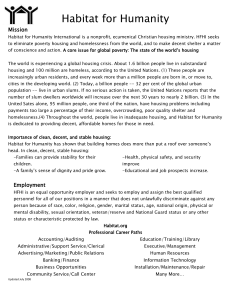Study Questions for Quiz 1
advertisement
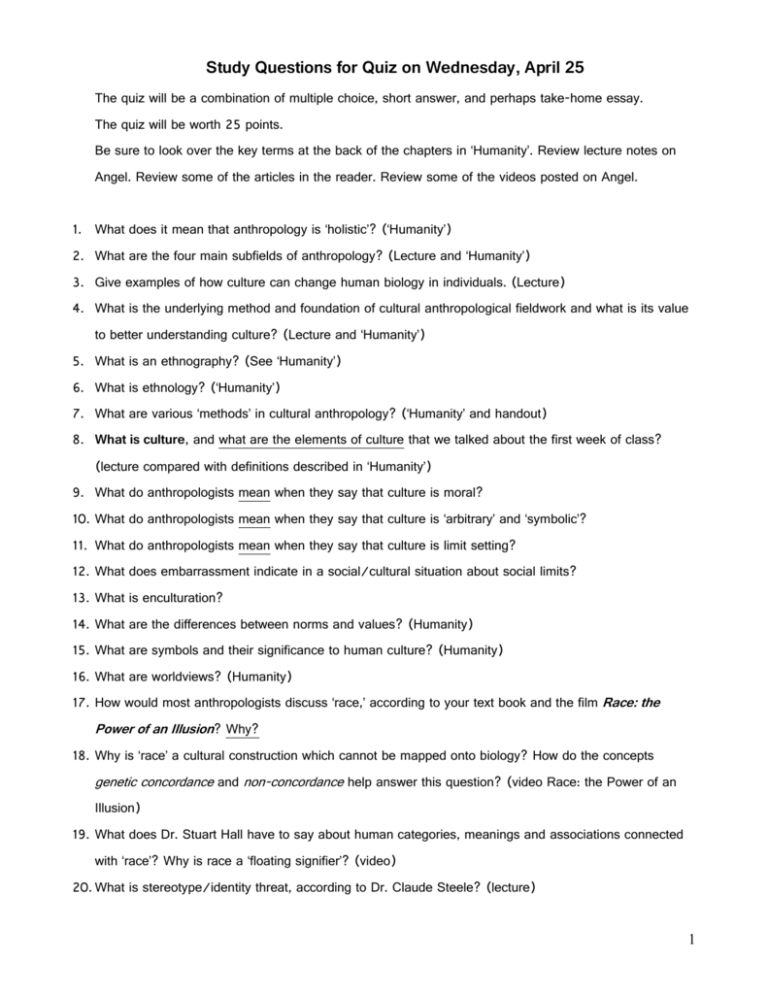
Study Questions for Quiz on Wednesday, April 25 The quiz will be a combination of multiple choice, short answer, and perhaps take-home essay. The quiz will be worth 25 points. Be sure to look over the key terms at the back of the chapters in ‘Humanity’. Review lecture notes on Angel. Review some of the articles in the reader. Review some of the videos posted on Angel. 1. What does it mean that anthropology is ‘holistic’? (‘Humanity’) 2. What are the four main subfields of anthropology? (Lecture and ‘Humanity’) 3. Give examples of how culture can change human biology in individuals. (Lecture) 4. What is the underlying method and foundation of cultural anthropological fieldwork and what is its value to better understanding culture? (Lecture and ‘Humanity’) 5. What is an ethnography? (See ‘Humanity’) 6. What is ethnology? (‘Humanity’) 7. What are various ‘methods’ in cultural anthropology? (‘Humanity’ and handout) 8. What is culture, and what are the elements of culture that we talked about the first week of class? (lecture compared with definitions described in ‘Humanity’) 9. What do anthropologists mean when they say that culture is moral? 10. What do anthropologists mean when they say that culture is ‘arbitrary’ and ‘symbolic’? 11. What do anthropologists mean when they say that culture is limit setting? 12. What does embarrassment indicate in a social/cultural situation about social limits? 13. What is enculturation? 14. What are the differences between norms and values? (Humanity) 15. What are symbols and their significance to human culture? (Humanity) 16. What are worldviews? (Humanity) 17. How would most anthropologists discuss ‘race,’ according to your text book and the film Race: the Power of an Illusion? Why? 18. Why is ‘race’ a cultural construction which cannot be mapped onto biology? How do the concepts genetic concordance and non-concordance help answer this question? (video Race: the Power of an Illusion) 19. What does Dr. Stuart Hall have to say about human categories, meanings and associations connected with ‘race’? Why is race a ‘floating signifier’? (video) 20. What is stereotype/identity threat, according to Dr. Claude Steele? (lecture) 1 21. Explain some of the social/political reasons Europeans and EuroAmericans historically defined and constructed race in the ways that they did? (‘Humanity’ and Race: the Power of an Illusion) 22. Review the handout “Ten Things Everyone Should Know about Race”. 23. What is ethnocentrism? What are some extremes of ethnocentrism? (lecture and text book) 24. What is cultural relativism and its importance in anthropology? What are some extremes of relativism? (lecture and ‘Humanity’) 25. Explain the fieldwork methodology participant observation. What information can you gain from participant observation that would likely be difficult to gather with other methods such as surveys, experiments, and structured interviews? What are other anthropological techniques? (Lecture and text book) 26. What did researchers discover about sleeping habits and practices cross culturally, according to authors of the article Slumber’s Unexplored Landscapes? What does this article tell us about cultural influences on biology? 27. Was Claire Sterk’s approach to studying prostitution in Tricking and Tripping a more etic or emic approach? Why? What did she learn? 28. What are ethical considerations for the ethnographer? (‘Humanity’ and Lecture) 29. What did Richard Borshay Lee learn about himself and his own ethnocentrisms through his fieldwork experiences with the !Kung San as described in the article Eating Christmas in the Kalahari? 30. What did Michael Wesch and his students discover about the significance of community or lack of community in relation to networked individualism as described in the film Anthropology of Youtube? 31. What is context collapse and aesthetic arrest, and why are these concepts significant in the Youtube experience, according to Wesch and his students? 32. What are cultural and social restraints connected with Youtube and the internet that differ in face to face circumstances? Why might people communicate with ‘hate’ comments or with ‘flaming’ in one context and less often in other contexts, according to Wesch and his students? 33. What does Wesch have to say about law, piracy, and Youtube? 34. Consider what tool, art, and other technology tells us about language and culture, prehistorically and historically. (video The Mind’s Big Bang) 35. What are some of the theories based in empirical evidence about how and why complex human language started and expanded? (video) 36. What are some of the biological connections with language discussed in the film? For example, what did Steven Pinker say about the intelligence of earlier humans 40,000 years ago compared with humans now? (video) 2 37. What is the significance of language to culture and vice versa? (video and lecture) 38. What can we learn from deaf communities about language and human communities? (video) 39. What is theory of mind and why is it significant in language complexity and culture? (lectures and videos) 40. What did Robin Dunbar say about gossip and the significance of gossip to the integrity of human groups? (video) 41. What does the video about Kanzi the bonobo and his sister tell us about non-human animal abilities to imitate, learn, and share language? (video) 42. Explain the Sapir Whorf Hypothesis and how some scientists have attempted to prove that language influences perceptions of the world. (primarily lecture) 43. Again, what is ‘Theory of Mind’ and its significance to human language and culture? 44. What is the definition of intelligence according to Gerhard Roth and Ursula Dicke? (lecture) 45. Who is Franz Boas and what is his role in development of the concepts of cultural and linguistic relativism? What is Boas’s notion of the psychic unity of humanity? (lecture and ‘Humanity’) 46. What is the importance of categorization in language to our understanding or perception of the world? (lecture and ‘Humanity’) 47. How did Dr. Lera Boroditsky work to demonstrate linguistic relativity based on her NPR interview? 48. What is the importance of language, storytelling, humor, and gossip to learning how to be part of culture groups? How we are enculturated through gossip, storytelling, and humor? 49. How is language a reflection of culture? (‘Humanity’) 50. What were Deborah Tannen’s main points in her article Fighting for Our Lives? What does she say about language patterns, habits, etc. and their influences on thinking and behavior? 51. What did Bohannan’s experience with the Tiv in Shakespeare in the Bush tell us about how culture frames meaning and interpretation? 3
